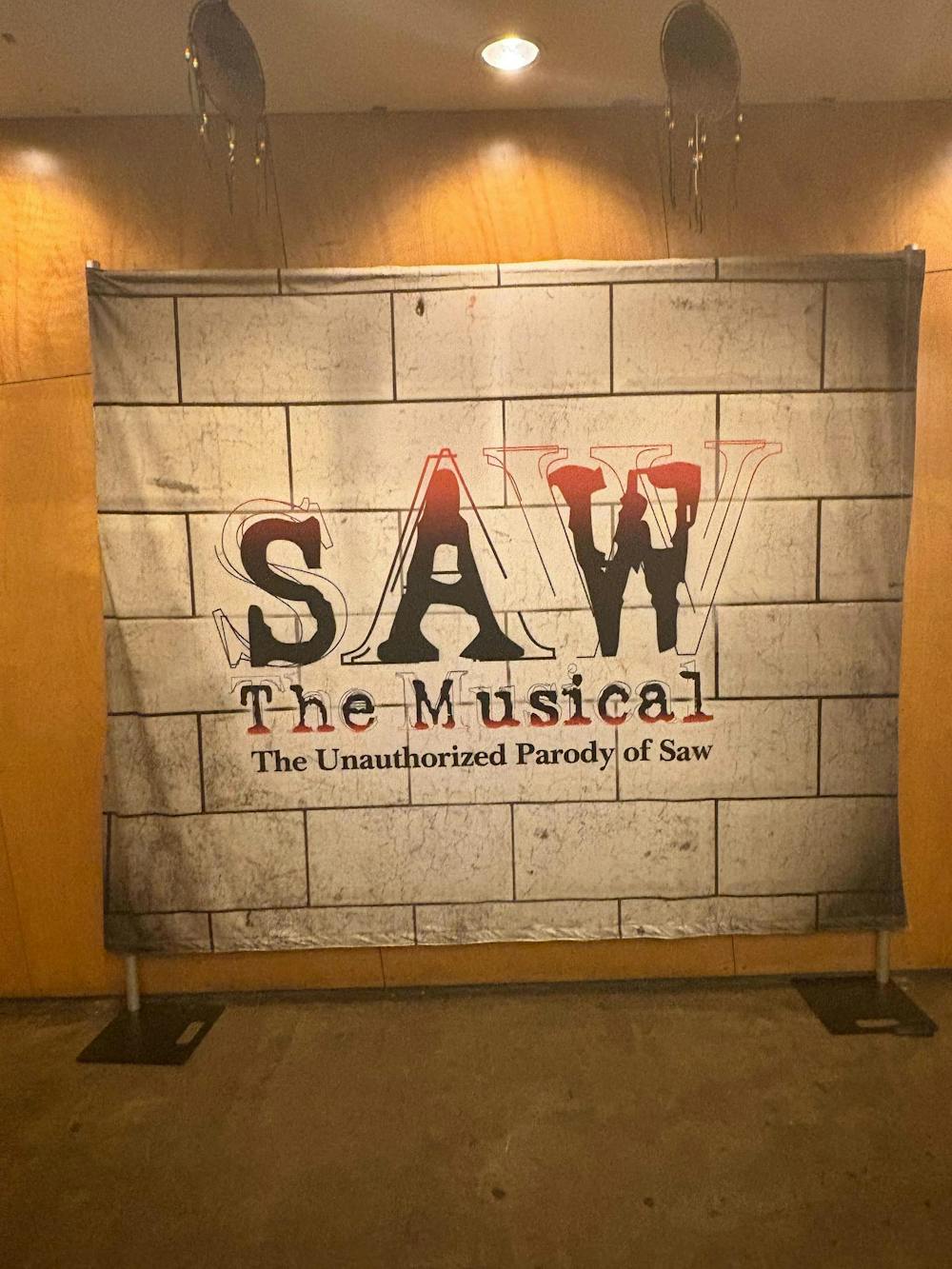In the heart of Atlanta’s characteristically quirky Little Five Points neighborhood, horror and drama combine in a subversive theatrical production. Showing at 7 Stages Theatre until Feb. 23, “SAW The Musical: The Unauthorized Parody of Saw” brings a gruesome and campy twist to the 2004 horror film. Premiering in New York in September 2023, “SAW The Musical” slashed its way onto the Atlanta stage on Jan. 31 as part of a national tour.
As the curtain rose, the stage glowed a fluorescent turquoise, complementing the set’s industrial stark white. Sounds of wind and scraping metal played over the speakers as Billy the Puppet (Morgan Traud) sat on center stage, watching the audience members as they took their seats. The stage illuminated as Billy the Puppet welcomed the audience in a burlesque and energetic song, “I Wanna Play A Game” — a fitting opener for a darkly funny production.
The musical was created by Cooper Jordan and written by his sister Zoe Ann Jordan, both of whom were inspired by the queer subtext of the original film. In an interview with NPR, Cooper Jordan emphasized that Jigsaw’s (Tobin Bell) mantra of “nourishing your life and living your life to the fullest” starkly contrasts with the divisiveness they see in America today. This nihilism brings depth to what might otherwise be just a silly parody.
“SAW The Musical” is psychologically complex, too, following a legacy of combining slasher gore with mind games set by the film franchise. In the movies, serial killer Jigsaw forces his victims to confront their vices through self-inflicted torture to survive his games. “SAW The Musical” dives deeper, asking its audience to draw its attention away from flashy traps and gore and toward the victims themselves.
While the “Saw” franchise often skims on characterizing its victims, the musical reimagines new, well-written characters from the bleak and empty originals. Lawrence Gordon (Adam Forward) is a bisexual oncologist who revels in the sadism of his job. Adam Stanheight (James Lynch) is a bubbly and airheaded photographer. Amanda Young (Morgan Traud) is a destitute heroin addict turned empowered apprentice to Jigsaw (Morgan Traud). Even the iconic Billy the Puppet is parodied as a quippy, fourth-wall-breaking puppet who creates his traps based on the motto “cleanliness is next to godliness.”
The campiness in the parody shines in the actors’ over-exaggeration of the original characters’ defining personality traits. Lynch speaks in a high-pitched and squeaky falsetto to mimic Stanheight’s obnoxiousness, while Forward randomly swaps to a British accent to accentuate Gordon’s overly professional attitude. Stanheight and Gordon are the main sources of the show’s over-the-top humor, from Stanheight pulling many strips of condoms out of his pocket before finding a clue, to Gordon dancing a tango with a life-sized doll.
Each actor is versatile in their portrayals, seamlessly blending comedic timing with an intensity that captures the absurdity of the original film. Traud is a dynamic presence on stage, blending confidence with wittiness in her roles as both Billy the Puppet and Amanda. Lynch masterfully balances his character’s whiny obliviousness with an endearing charm, making him both relatable and amusing. Nowhere is this more evident than when he earnestly bursts into song about his deep desire to take Gordon to Applebee’s Grill and Bar once the trap ordeal is over.
The score, composed by Patrick Spencer and Anthony de Angelis, also features a blend of vaudevillian show tunes, power ballads and love duets. Most of the musical numbers revel in raunchy humor and playful jabs at the original film, with one number dedicated to Gordon’s wife easily beating her captor by “pull[ing] some unexplained combat skills out of her a--.” Yet, amid the absurdity, the musical surprisingly elevates the central theme of the “Saw” franchise: what it means to value your life.
While the “Saw” franchise focuses more on the victims’ trauma following their traps, the musical uses the traps more as a metaphor for the characters to confront and embrace who they really are. This is best embodied when Gordon kisses Adam before leaving to find help. After struggling with his sexuality for most of the runtime, between despising his wife and kid to having an affair with a female coworker, Gordon embraces his desire for Adam — which he confined to his internal dialogue for most of the show.
“SAW The Musical” is both a parody and a love letter to the original film, represented best by the depth contributed to each character. While the show is best described as campy and raunchy, the nuanced message of embracing yourself to live life to the fullest is undeniably relevant, especially in today’s social climate in which self-expression and authenticity are often challenged by the current political system. In an era of increasing advocacy for personal identity and acceptance, this musical serves as both a witty take on the original film and a celebration of unapologetic individuality.

Paige Hogan (27C) is from Dallas, Texas, and is majoring in Chemistry and Classical Civilization. Outside of the Wheel, she is on the executive boards of both her sorority, Delta Phi Epsilon, and the Emory Anime Club.In her free time, she enjoys hiking, listening to Arctic Monkeys, and marathoning all 10 Saw movies.






